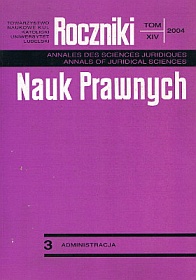Decentralisation of Public Administration
Abstract
Decentralisation of public administration in Poland has been discussed many times, especially in the period when the guidelines of the political reform of the state were being worked out. The introduction of decentralisation into the Polish legal order in the 1990s constituted an enormous breakthrough. It was important not only for the functioning of the state, but also had a political character that meant departure from the former system. The administrative apparatus is one of the elements of a democratic state of law; it is a component that ensures a proper activity of the state. Public administration is a group of organs working in the state. It can also be understood as fulfilling administrative functions by non-state subjects, i.e. the fulfilment of public tasks on the part of self-governmental units or non-public subjects in particular cases. The fact that intervention of a higher organ is limited makes it possible that lower organs can be independent. This independence is obviously limited within the framework of the binding legal system, and is at the same time a border of decentralisation. This is the foundation of a proper functioning of administration in a democratic legal state. It consists first of all on the departure from a hierarchic subordination between the organs of the authorities and administration and is based on the instruments of control. Decentralisation is a process that occurs within administrative structure, but it is also the system of administrative organisation itself. As opposed to centralisation, which holds power on a higher level, decentralisation ensures making decisions on lower levels. The public tasks are performed by decentralised subjects on their own behalf and their own liability.
Copyright (c) 2004 Roczniki Nauk Prawnych

This work is licensed under a Creative Commons Attribution-NonCommercial-NoDerivatives 4.0 International License.


